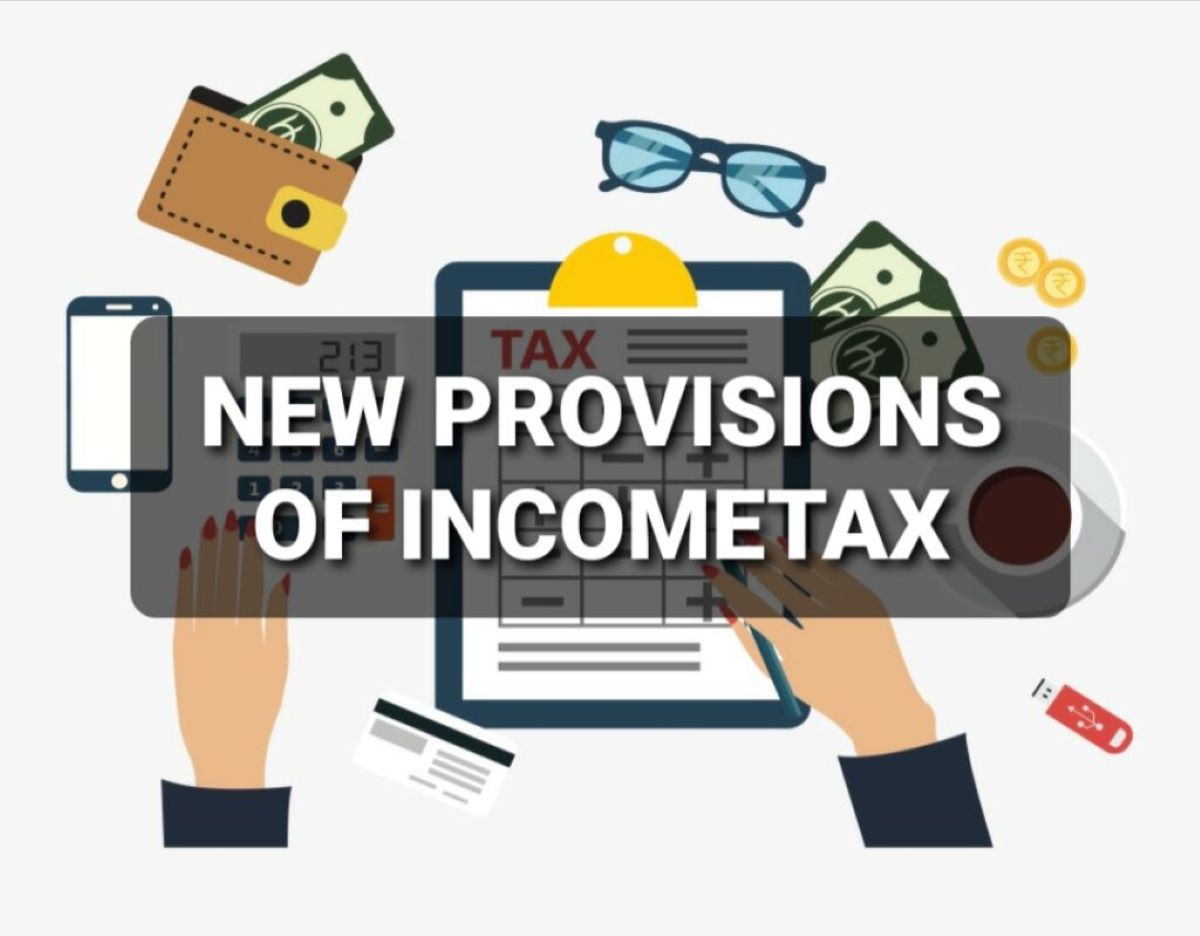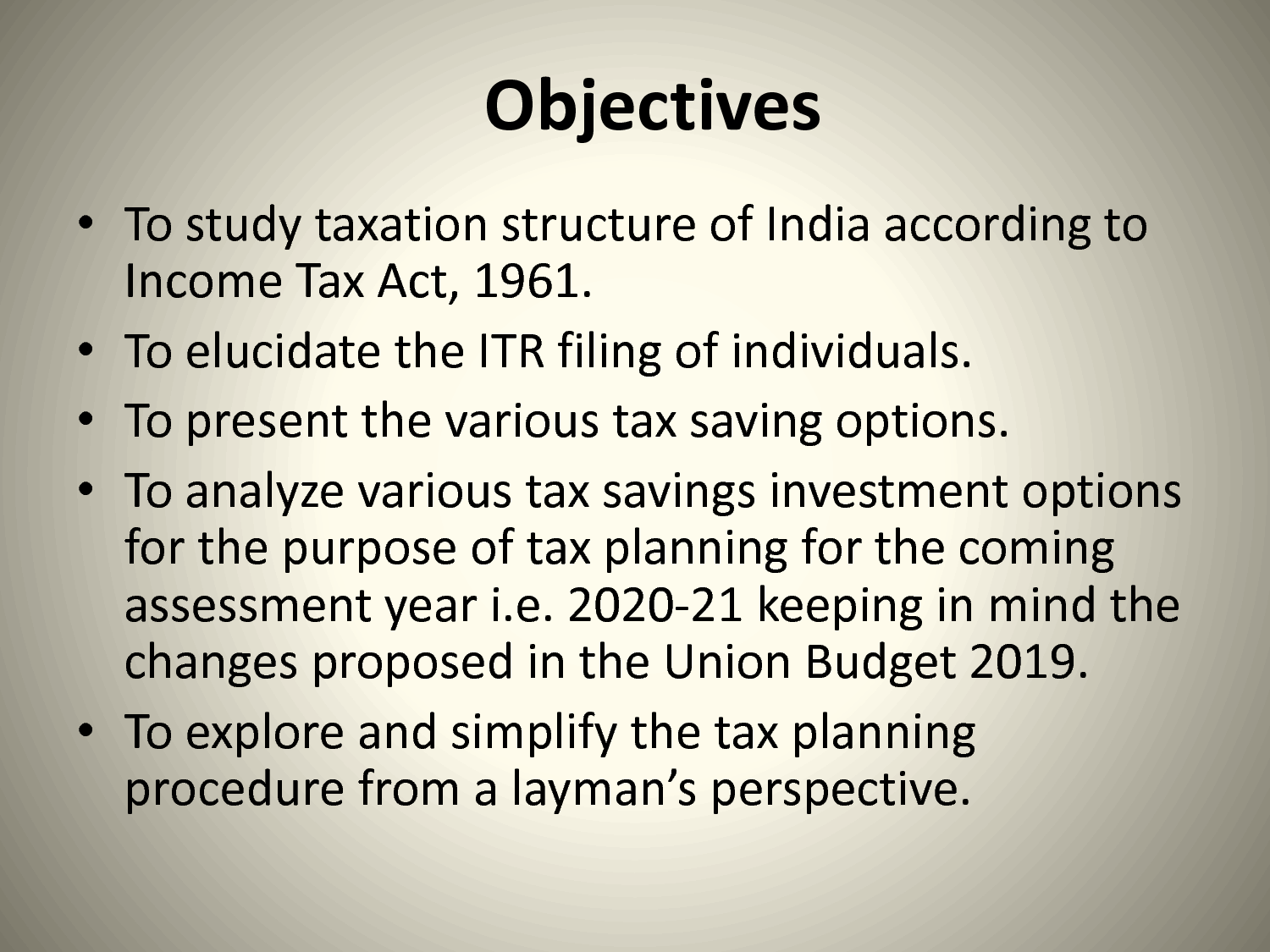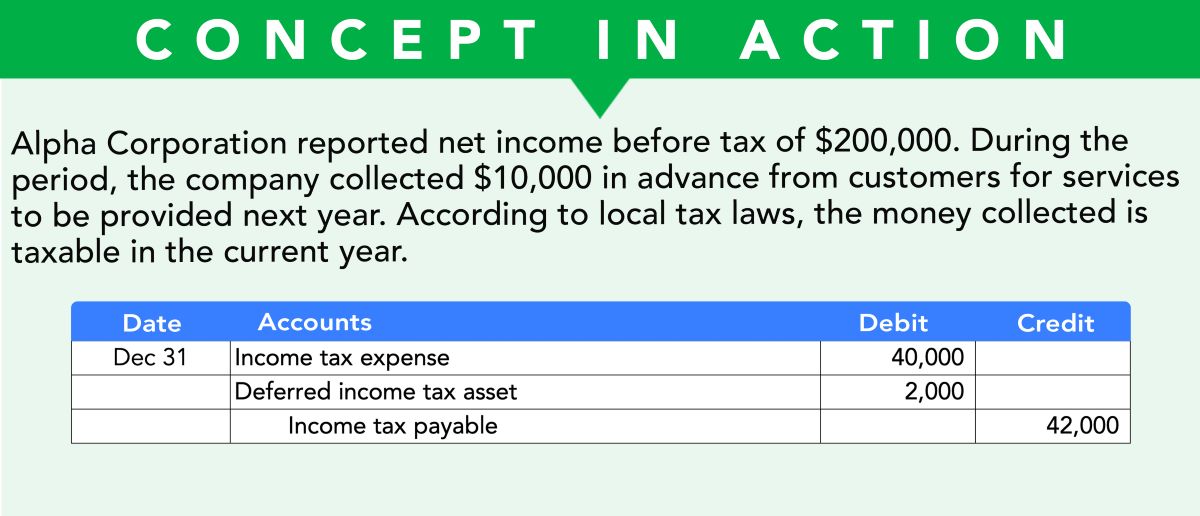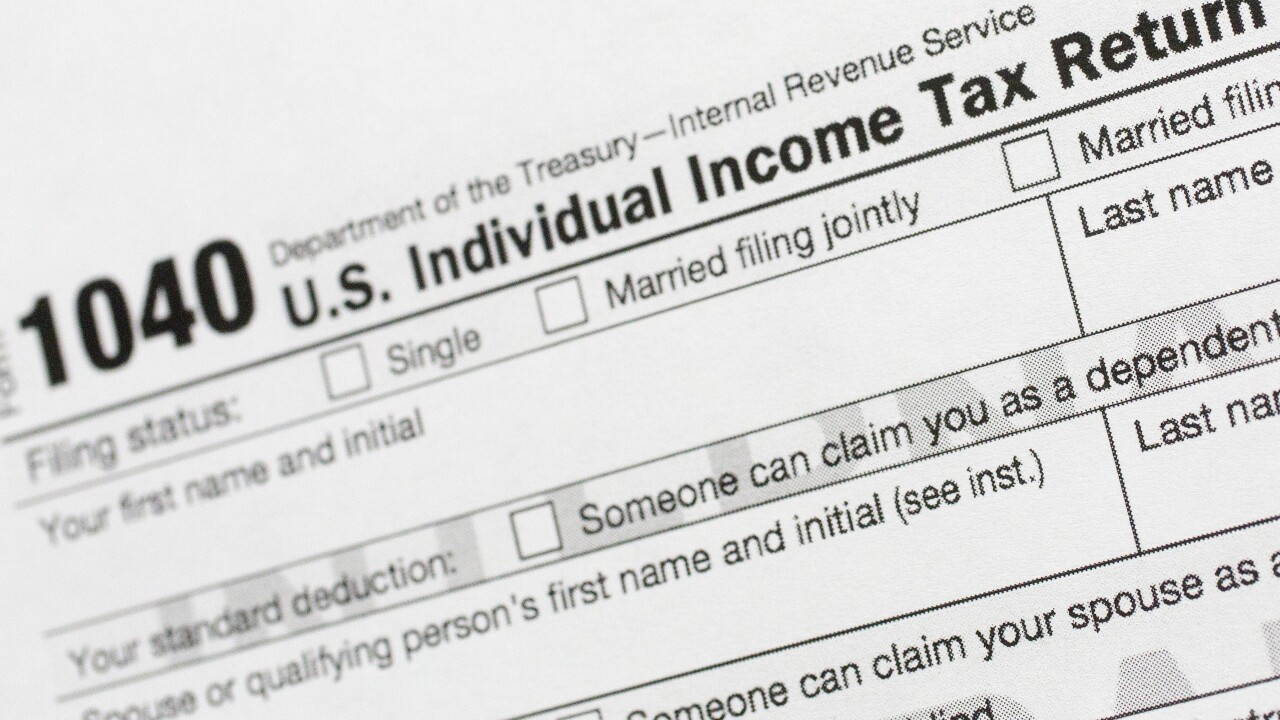

Finance
What Is Tax Planning In Income Tax
Published: January 21, 2024
Learn the importance of tax planning in income tax and how it impacts your finances. Discover effective strategies for managing your taxes and maximizing financial benefits.
(Many of the links in this article redirect to a specific reviewed product. Your purchase of these products through affiliate links helps to generate commission for LiveWell, at no extra cost. Learn more)
Table of Contents
Introduction
Tax planning plays a crucial role in managing personal and business finances. It involves strategic decision-making to minimize tax liabilities and maximize tax savings. As individuals and businesses are subject to income tax, understanding the concept of tax planning becomes essential to navigate the complex world of taxation.
Income tax is a common form of tax imposed on individuals, corporations, and other entities based on their annual income. It is levied by governments worldwide to generate revenue for public services and infrastructure development. However, the tax code can be intricate and overwhelming, leading to potential financial burdens if not managed effectively.
Tax planning is the process of optimizing financial decisions to minimize tax liabilities in a legal and ethical manner. It involves analyzing the income, expenses, deductions, and credits to develop a strategic approach that maximizes tax-saving opportunities. By implementing effective tax planning strategies, individuals and businesses can legally reduce their overall tax burdens and potentially increase their after-tax income.
The primary objective of tax planning is to align financial decisions with tax laws and regulations to achieve the most advantageous tax position. It requires a sound understanding of the tax code and expertise in leveraging available deductions, credits, exemptions, and tax-efficient investment options.
There are various tax planning strategies that individuals and businesses can employ to minimize their tax liabilities. From taking advantage of tax-advantaged investment accounts to utilizing income deferral techniques, these strategies can significantly impact one’s overall tax position and financial well-being.
Effective tax planning not only helps individuals and businesses save money but also ensures compliance with tax laws and regulations. It provides a clear roadmap for making financial decisions and assists in identifying potential tax-saving opportunities throughout the year.
However, it is essential to approach tax planning with careful consideration and professional advice. While tax planning aims to legally minimize tax liabilities, it is crucial to avoid aggressive tax avoidance schemes that may lead to penalties and legal complications.
In this article, we will explore the importance of tax planning, different tax planning strategies, and key considerations for effective tax planning. We will also highlight common mistakes to avoid in tax planning to ensure a holistic understanding of this vital financial practice.
Importance of Tax Planning
Tax planning is of immense importance for individuals and businesses alike. It allows them to optimize their financial decisions and ensure efficient tax management. Here are some key reasons why tax planning is essential:
- Minimize Tax Liabilities: One of the primary objectives of tax planning is to minimize tax liabilities. By strategically utilizing deductions, exemptions, credits, and tax-saving investment options, individuals and businesses can significantly reduce the amount of taxes they owe. This helps in preserving more of their hard-earned money and increasing their overall financial well-being.
- Increase Cash Flow: By minimizing tax liabilities, tax planning provides individuals and businesses with increased cash flow. The money saved from paying less in taxes can be reinvested, used for business expansion or personal endeavors, or allocated towards savings and investments. This can have a profound impact on wealth accumulation and achieving long-term financial goals.
- Maximize Tax Deductions and Credits: Tax planning ensures individuals and businesses take advantage of all available deductions and credits they qualify for. By carefully analyzing their financial situation and aligning it with the tax code, they can claim deductions for expenses such as mortgage interest, medical expenses, education expenses, and more. Additionally, tax credits like the Earned Income Tax Credit (EITC) and Child Tax Credit can provide significant financial relief.
- Plan for Tax Liability: Through effective tax planning, individuals and businesses can anticipate their tax liabilities in advance. This allows them to set aside funds or make necessary adjustments to ensure they have the financial resources to meet their tax obligations. By avoiding last-minute surprises, they can maintain better control over their finances and avoid unnecessary financial strain.
- Ensure Compliance: Tax planning goes hand in hand with tax compliance. By staying updated on the ever-changing tax laws and regulations, individuals and businesses can ensure that their financial decisions align with the legal requirements. This helps avoid penalties, audits, and potential legal issues that may arise from non-compliance.
In summary, tax planning is crucial for minimizing tax liabilities, maximizing cash flow, and optimizing financial decision-making. It ensures individuals and businesses are taking full advantage of available tax deductions and credits while maintaining compliance with tax laws. By implementing effective tax planning strategies, individuals and businesses can achieve significant long-term financial benefits and peace of mind.
Understanding Income Tax
Income tax is a form of tax that is imposed on individuals, corporations, and other entities based on their income. It is one of the primary sources of revenue for governments around the world and is used to fund public services and infrastructure development.
Income tax is calculated based on the taxable income of an individual or entity. Taxable income is determined by deducting allowable deductions and exemptions from the total income earned during a specific tax year.
There are typically different tax brackets or tax rates that apply to different income levels. The tax rates are progressive, meaning that as the income increases, the tax rate also increases. This implies that those with higher income levels pay a higher percentage of their income in taxes compared to those with lower income levels.
Various types of income are subject to income tax, including but not limited to:
- Wages and salaries
- Business profits
- Investment income (such as dividends, interest, and capital gains)
- Rental income
- Unemployment compensation
- Social security benefits (in some cases)
It is important to note that not all income is taxable. Certain types of income may be exempt from taxation or subject to special tax treatment. For example, tax-exempt municipal bond interest and certain retirement account distributions may be excluded from taxable income.
To ensure accurate reporting and payment of income tax, individuals and businesses are typically required to file tax returns with the appropriate tax authorities. These tax returns provide a detailed breakdown of income, deductions, and credits, allowing the tax authorities to assess the tax liability for a specific period.
Taxpayers may also be required to make estimated tax payments throughout the year based on their expected income. Failure to pay the proper amount of income tax can result in penalties and interest.
Understanding income tax is essential for effective tax planning. By having a clear understanding of the tax system and the various components of income tax, individuals and businesses can make informed financial decisions and optimize their tax positions.
In the next sections, we will explore what tax planning entails and the different strategies that can be employed to minimize tax liabilities and maximize tax savings.
What is Tax Planning?
Tax planning is the process of strategically managing one’s financial affairs in order to minimize tax liabilities and maximize tax savings. It involves making informed decisions and taking advantage of available deductions, credits, exemptions, and tax-efficient investment options.
At its core, tax planning aims to legally reduce the amount of taxes individuals and businesses owe by optimizing their financial activities. It requires a thorough understanding of the tax laws and regulations, as well as careful consideration of the specific financial circumstances.
Tax planning is not about evading taxes or engaging in illegal activities to avoid paying taxes. Rather, it focuses on utilizing the provisions and incentives provided by the tax system to reduce the overall tax burden. It is a proactive approach that requires thoughtful consideration and long-term planning.
Effective tax planning encompasses a range of activities, including:
- Evaluating the most tax-efficient business structures
- Optimizing deductions and credits
- Strategically timing income and expenses
- Utilizing tax-advantaged investment accounts
- Implementing estate planning strategies
- Considering charitable contributions
Tax planning is not a one-size-fits-all process. Each individual or business has unique financial circumstances and goals that require personalized tax planning strategies. It often involves working closely with tax professionals, such as accountants or tax advisors, who possess the necessary expertise and knowledge of the tax laws.
By engaging in tax planning, individuals and businesses can:
- Minimize taxable income by taking advantage of all available deductions and exemptions
- Manage capital gains and losses to optimize tax outcomes
- Maximize tax credits to reduce tax liabilities
- Reduce the overall tax burden, thereby preserving more income and wealth
- Ensure compliance with tax laws and regulations
It is important to note that tax planning is an ongoing process that should be integrated into one’s overall financial management. As tax laws change and financial circumstances evolve, tax planning strategies may need to be adjusted to reflect the latest regulations and optimize tax outcomes.
In the next sections, we will explore the objectives, types of tax planning strategies, and the benefits of tax planning in income tax.
Objectives of Tax Planning
Tax planning serves several key objectives, all aimed at minimizing tax liabilities and optimizing the overall tax position of individuals and businesses. These objectives guide the strategic decision-making process in tax planning. Here are some common objectives:
1. Minimize Tax Liabilities:
The primary objective of tax planning is to minimize tax liabilities. By implementing effective tax planning strategies, individuals and businesses can legally reduce the amount of taxes they owe. This allows them to keep more of their hard-earned money and allocate it towards other financial goals such as savings, investments, or business expansion.
2. Maximize Tax Savings:
Tax planning aims to maximize tax savings by taking full advantage of available deductions, credits, exemptions, and tax-efficient investment options. By strategically utilizing these provisions within the tax code, individuals and businesses can optimize their overall tax position and increase their after-tax income.
3. Achieve Tax Efficiency:
Tax efficiency is an important objective of tax planning. It involves structuring financial transactions and activities in a way that minimizes the tax consequences. This can include evaluating the most tax-efficient business structures, timing income and expenses, and considering the tax implications of investment decisions. By achieving tax efficiency, individuals and businesses can optimize their financial outcomes.
4. Ensure Compliance:
Compliance with tax laws and regulations is another significant objective of tax planning. By staying updated with the latest tax laws and regulations, individuals and businesses can ensure that their tax planning strategies are within the legal boundaries. This helps mitigate the risk of penalties, audits, and potential legal complications that may arise from non-compliance.
5. Provide Long-Term Financial Stability:
Tax planning aims to provide long-term financial stability by incorporating tax considerations into overall financial management. By aligning financial decisions with tax objectives, individuals and businesses can achieve sustainable and predictable tax outcomes. This ensures that they are well-prepared to meet their tax obligations and maintain financial stability for the future.
It is important to note that the objectives of tax planning may vary depending on individual or business circumstances. Each taxpayer has unique goals and requirements that should be considered in developing personalized tax planning strategies. Seeking professional advice from tax experts can provide valuable insights and guidance in achieving specific tax planning objectives.
In the next sections, we will explore different types of tax planning strategies and the benefits they offer in income tax management.
Types of Tax Planning Strategies
Tax planning strategies encompass a wide range of techniques and approaches that individuals and businesses can employ to minimize their tax liabilities and optimize their tax positions. These strategies leverage various provisions within the tax code to legally reduce the overall tax burden. Here are some common types of tax planning strategies:
1. Deduction Optimization:
One of the key tax planning strategies is optimizing deductions. This involves identifying and maximizing all available deductions that individuals and businesses qualify for. Deductions such as mortgage interest, medical expenses, education expenses, and business expenses can significantly reduce taxable income, ultimately lowering the tax liability.
2. Timing of Income and Expenses:
The timing of income and expenses can play a vital role in tax planning. Deferring income into a later tax year or accelerating expenses into the current tax year may help reduce the tax liability. This strategy is particularly useful in situations where individuals or businesses anticipate a lower tax rate in the future or want to take advantage of expiring tax credits or deductions.
3. Utilizing Tax-Advantaged Investment Accounts:
Tax-advantaged investment accounts, such as Individual Retirement Accounts (IRAs) and 401(k) plans, offer tax benefits that can be leveraged in tax planning. Contributions to these accounts are often tax-deductible or made with pre-tax income, and earnings within the account are tax-deferred until withdrawal. By maximizing contributions to these accounts, individuals can reduce their taxable income and potentially grow their investments tax-free.
4. Entity Structuring:
For businesses, entity structuring is an important tax planning strategy. Choosing the right business structure, such as a sole proprietorship, partnership, corporation, or limited liability company (LLC), can have significant tax implications. Each entity type has different tax rules and provisions, and selecting the most tax-efficient structure can help minimize the overall tax burden on the business.
5. Tax Credits Utilization:
Another tax planning strategy involves taking advantage of various tax credits. Tax credits provide a dollar-for-dollar reduction in tax liability, making them highly valuable. Examples of tax credits include the Child Tax Credit, the Earned Income Tax Credit (EITC), and energy-efficient home improvement credits. By understanding and utilizing these credits, individuals and businesses can significantly reduce their overall tax liability.
6. Estate Planning:
Estate planning is a tax planning strategy that focuses on minimizing taxes associated with wealth transfer. It involves creating and implementing strategies to manage assets and plan for the distribution of wealth in a tax-efficient manner. By employing techniques such as gifting, trusts, and proper beneficiary designations, individuals can reduce estate taxes and minimize the tax impact on their heirs.
It is essential to note that effective tax planning requires a comprehensive understanding of the specific tax laws, regulations, and individual financial circumstances. Engaging with qualified tax professionals can provide valuable guidance in identifying the most suitable tax planning strategies and maximizing their benefits.
In the next section, we will explore the benefits of tax planning in income tax management.
Benefits of Tax Planning in Income Tax
Tax planning in income tax management offers several significant benefits for individuals and businesses. By strategically managing their finances and optimizing their tax positions, taxpayers can experience various advantages. Here are some key benefits of tax planning in income tax:
1. Reduced Tax Liabilities:
One of the primary benefits of tax planning is the reduction of tax liabilities. By utilizing tax planning strategies, individuals and businesses can take advantage of available deductions, exemptions, credits, and tax-efficient investment options. This minimizes the amount of taxes owed, resulting in increased savings and improved financial well-being.
2. Increased Tax Savings:
Tax planning allows individuals and businesses to maximize their tax savings by efficiently managing their income and expenses. By timing certain financial transactions and taking advantage of tax-advantaged accounts and investments, taxpayers can optimize their tax outcomes and potentially save a significant amount of money over time.
3. Enhanced Cash Flow:
Effective tax planning also improves cash flow. By minimizing tax liabilities and maximizing tax savings, individuals and businesses have more disposable income available. The money saved in taxes can be reinvested into the business, used for personal expenses, directed towards savings and investments, or utilized for other financial goals. This increased cash flow can have a substantial impact on individual and business financial stability and growth.
4. Improved Financial Planning:
Tax planning is an integral part of comprehensive financial planning. By incorporating tax considerations into overall financial management, individuals and businesses can make informed decisions regarding investments, retirement planning, estate planning, and other financial goals. Tax planning provides a clear roadmap for financial planning and ensures that resources are allocated in the most tax-efficient manner.
5. Compliance with Tax Laws:
Tax planning helps individuals and businesses stay in compliance with tax laws and regulations. By staying updated on the latest tax rules and provisions, taxpayers can ensure that their financial decisions align with legal requirements. This mitigates the risk of penalties, audits, and potential legal complications associated with non-compliance.
6. Peace of Mind:
By engaging in tax planning, taxpayers gain peace of mind regarding their tax obligations. Knowing that their tax positions have been optimized and that they have legally minimized their tax liabilities provides a sense of financial security. Tax planning reduces uncertainty and allows individuals and businesses to confidently manage their tax obligations.
In summary, tax planning in income tax management offers several benefits, including reduced tax liabilities, increased tax savings, enhanced cash flow, improved financial planning, compliance with tax laws, and peace of mind. By implementing effective tax planning strategies, individuals and businesses can significantly improve their financial well-being and achieve their long-term financial goals.
In the next section, we will discuss some key considerations for effective tax planning.
Key Considerations for Effective Tax Planning
Effective tax planning involves careful consideration of various factors to optimize one’s tax position and minimize tax liabilities. To ensure the success of tax planning strategies, individuals and businesses should take into account the following key considerations:
1. Understand Tax Laws and Regulations:
A comprehensive understanding of tax laws and regulations is crucial for effective tax planning. Tax laws can be complex and subject to frequent changes. Staying updated with the latest tax code provisions and regulations helps taxpayers make informed decisions and take advantage of available tax benefits.
2. Personalized Approach:
Effective tax planning requires a personalized approach tailored to individual or business circumstances. Each person has unique financial goals, income sources, and deductions eligibility. Customizing tax planning strategies based on these factors maximizes the potential tax savings and ensures compliance with relevant tax laws.
3. Timing and Documentation:
The timing of financial transactions plays a critical role in tax planning. Being aware of the tax year boundaries and strategically timing income and expenses can result in significant tax savings. Additionally, thorough documentation of financial transactions and maintaining proper records is essential for substantiating deductions and credits during tax filing.
4. Seek Professional Guidance:
Tax laws and regulations are complex, and tax planning involves intricate financial considerations. Seeking professional guidance from tax advisors, certified public accountants (CPAs), or tax consultants can provide invaluable expertise. These professionals can navigate the tax landscape, offer tailored strategies, and ensure compliance with tax laws.
5. Long-Term Considerations:
Effective tax planning is not limited to current tax liabilities but also takes into account long-term financial goals. It involves considering the potential impact of tax planning strategies on future tax years, retirement planning, and wealth transfer. Taking a holistic approach ensures that tax planning aligns with long-term financial objectives.
6. Regular Review and Adjustment:
Tax laws change over time, and financial circumstances evolve. Regularly reviewing and adjusting tax planning strategies to reflect these changes is crucial. Conducting periodic reviews ensures that tax planning remains in alignment with the latest tax regulations and maximizes tax savings opportunities.
By considering these key factors, individuals and businesses can develop effective tax planning strategies that minimize tax liabilities, maximize tax savings, and achieve their financial objectives.
In the next section, we will highlight some common mistakes to avoid in tax planning to ensure a successful and compliant approach.
Common Mistakes to Avoid in Tax Planning
While tax planning is essential for optimizing tax positions and minimizing tax liabilities, it is important to steer clear of certain common mistakes that can have adverse consequences. Avoiding these mistakes ensures a successful and compliant approach to tax planning. Here are some common mistakes to avoid:
1. Neglecting Proper Recordkeeping:
One of the most significant mistakes is failing to maintain accurate and organized records of financial transactions and supporting documents. Proper recordkeeping is crucial for substantiating deductions, credits, and other income-related information during tax filing. Without adequate documentation, taxpayers may face challenges in defending their tax positions in case of audits or inquiries from tax authorities.
2. Overlooking Tax Law Changes:
Tax laws and regulations are subject to frequent changes, both at the federal and state levels. Failing to stay updated with these changes can result in missed opportunities for tax savings or unintentional non-compliance. It is crucial to stay informed about the latest tax code provisions and consult with tax professionals to ensure tax planning strategies align with the current tax landscape.
3. Underestimating the Importance of Tax Credits and Deductions:
Some taxpayers overlook the full range of tax credits and deductions they may be eligible for. This can result in missed opportunities to minimize tax liabilities. It is essential to review available tax credits and deductions each year to ensure that all potential benefits are claimed. Properly identifying and utilizing these tax breaks can significantly reduce tax liabilities.
4. Failing to Plan for Future Tax Obligations:
Effective tax planning should consider future tax obligations, not just the current year. Failing to anticipate and plan for upcoming tax liabilities can lead to financial strain and missed opportunities for tax savings. Taxpayers should project their future income and potential changes in tax regulations to adjust their strategies accordingly.
5. Relying Solely on Tax Software:
While tax software can be a valuable tool, relying solely on it without understanding the underlying tax principles can be a mistake. Tax software is designed to assist with tax preparation but may not take into account unique circumstances or potential tax planning strategies that could result in greater tax savings. It is important to seek professional advice when necessary and use tax software as a tool rather than the sole resource.
6. Engaging in Tax Evasion or Aggressive Tax Avoidance Schemes:
Attempting to evade taxes or engaging in aggressive tax avoidance schemes can have severe legal and financial consequences. These activities violate tax laws and can result in penalties, fines, and even criminal charges. It is essential to focus on legitimate tax planning strategies that comply with tax laws and regulations while optimizing tax outcomes.
By avoiding these common mistakes, individuals and businesses can ensure a successful and compliant tax planning approach. Seeking professional guidance, staying informed about tax laws, maintaining proper records, and making informed financial decisions are key to effective tax planning.
Next, we will conclude the article with a summary of the key points discussed.
Conclusion
Tax planning is a vital practice for individuals and businesses to optimize their tax positions and minimize tax liabilities. By strategically managing their financial affairs and leveraging available tax provisions, taxpayers can achieve significant benefits, including reduced tax liabilities, increased tax savings, enhanced cash flow, and improved financial planning. However, effective tax planning requires careful consideration of various factors.
Understanding tax laws and regulations, personalizing tax planning strategies, proper timing and documentation, seeking professional guidance, and considering long-term financial goals are key considerations for effective tax planning. By avoiding common mistakes such as neglecting recordkeeping, overlooking tax law changes, underutilizing tax credits and deductions, and engaging in illegal tax practices, taxpayers can ensure a successful and compliant approach to tax planning.
With proper tax planning, individuals and businesses can not only reduce their tax burdens but also maintain compliance with tax laws, achieve financial stability, and confidently navigate their tax obligations. By optimizing their tax positions, individuals and businesses can dedicate more resources to savings, investments, business growth, and other financial goals, leading to long-term financial success.
It is crucial to stay informed about changes in tax laws and regularly review tax planning strategies to adapt to evolving tax landscapes. Seeking professional advice from tax experts can provide valuable insights and ensure that tax planning strategies are tailored to specific needs and goals.
In conclusion, by implementing effective tax planning strategies and avoiding common mistakes, individuals and businesses can achieve financial well-being, maximize tax savings, and ensure compliance with tax laws. Tax planning is not only a means to minimize tax liabilities but also a proactive approach to financial management and long-term wealth accumulation.














